Unit 9 Have you ever been to a museum Section B (2a-Self Check)课件(共40张PPT,含内嵌视频)人教版英语八年级下册
文档属性
| 名称 | Unit 9 Have you ever been to a museum Section B (2a-Self Check)课件(共40张PPT,含内嵌视频)人教版英语八年级下册 |
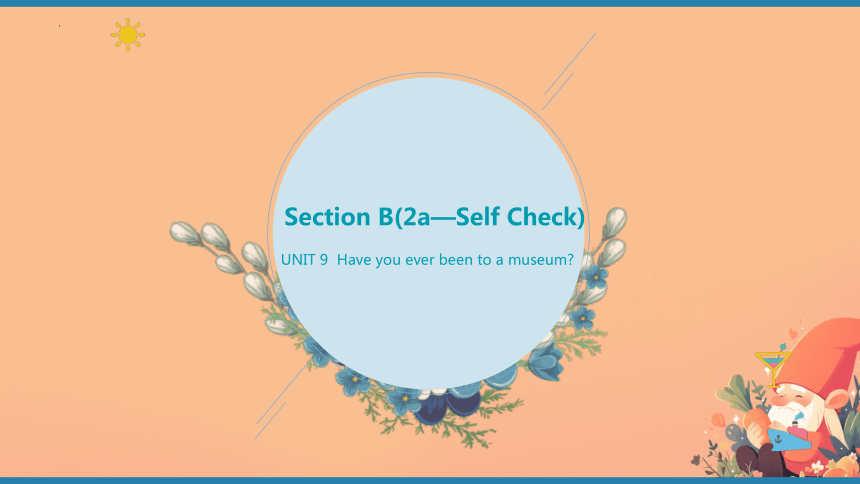
|
|
| 格式 | pptx | ||
| 文件大小 | 32.6MB | ||
| 资源类型 | 教案 | ||
| 版本资源 | 人教新目标(Go for it)版 | ||
| 科目 | 英语 | ||
| 更新时间 | 2025-06-21 00:00:00 | ||
图片预览



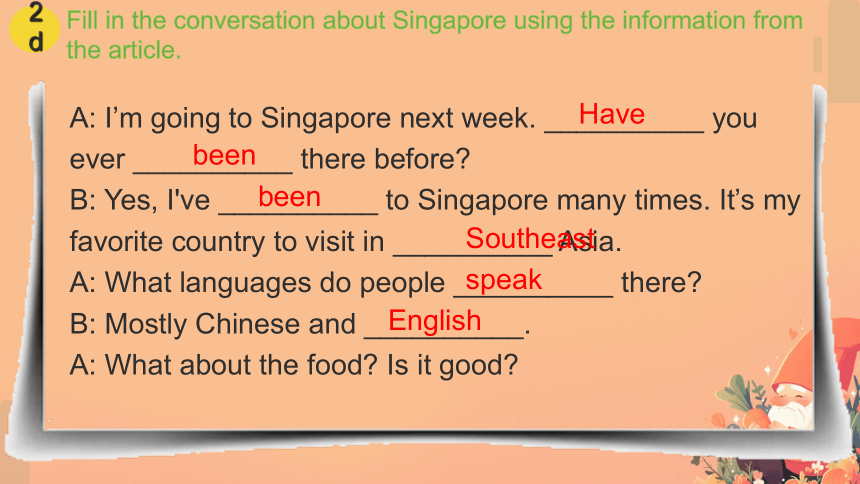
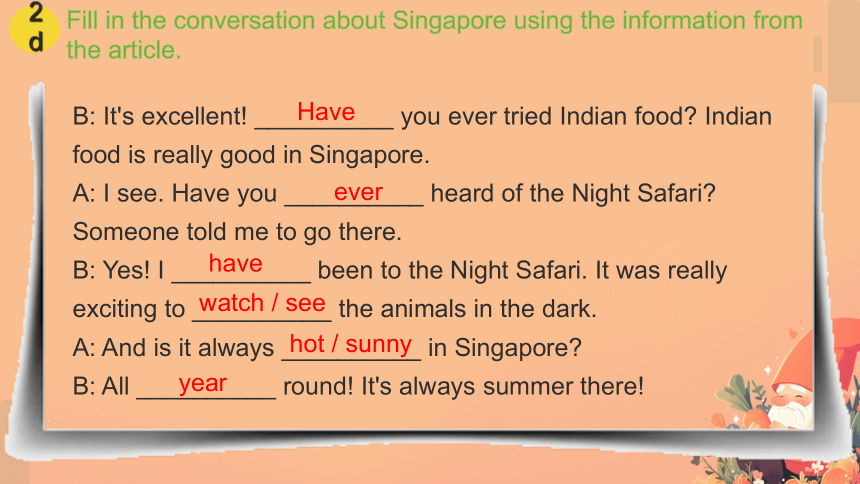
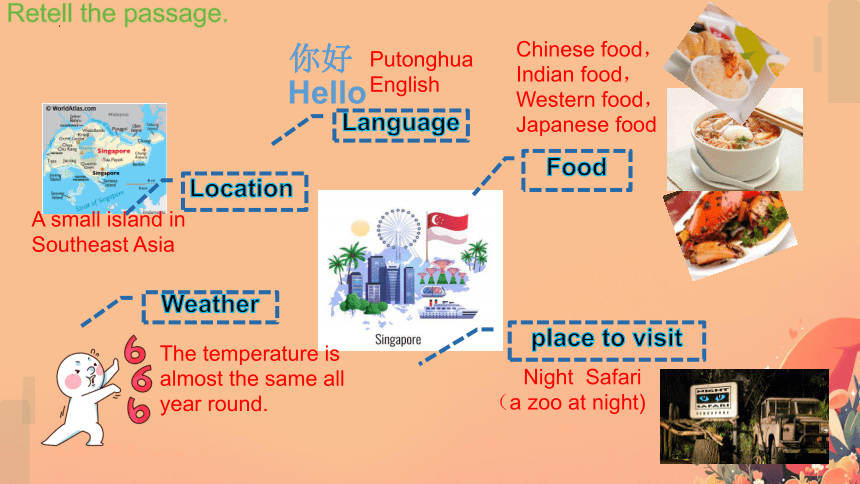
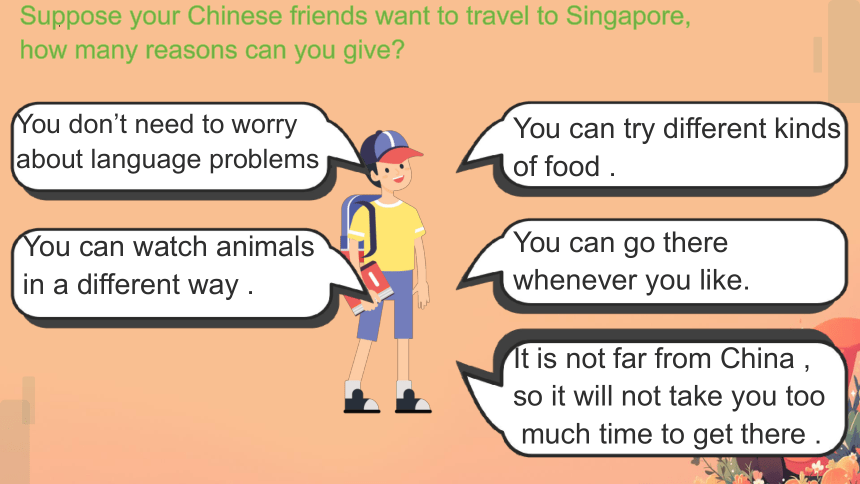
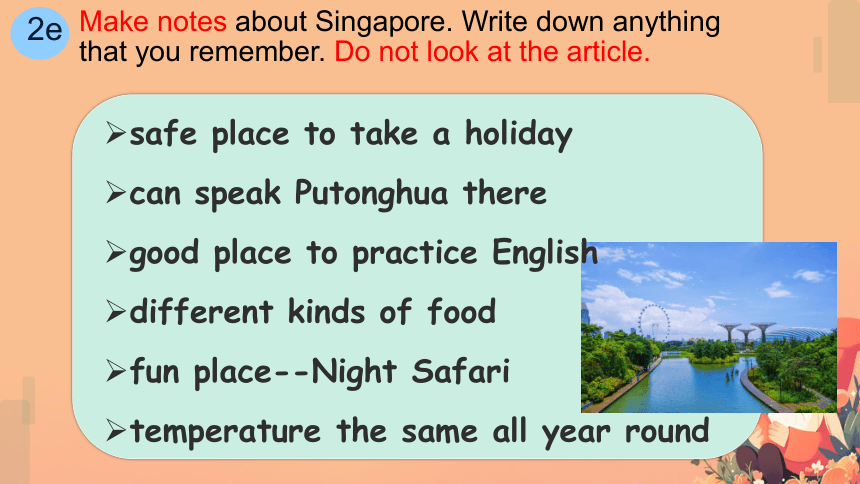
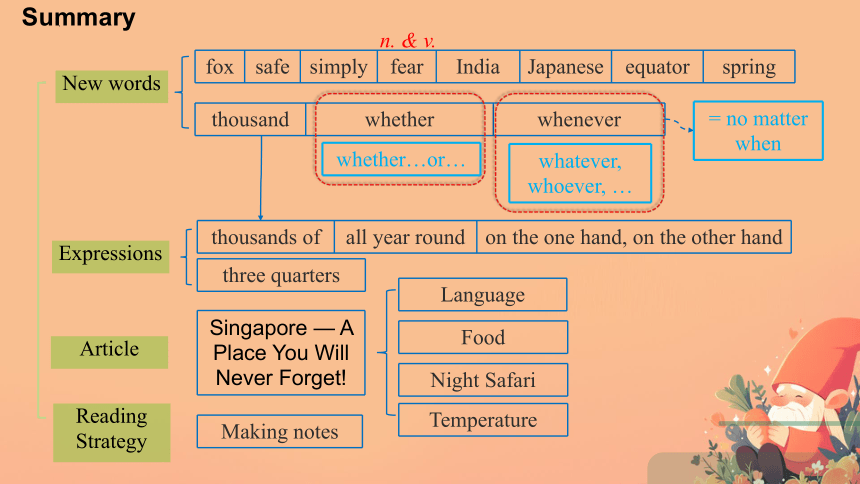
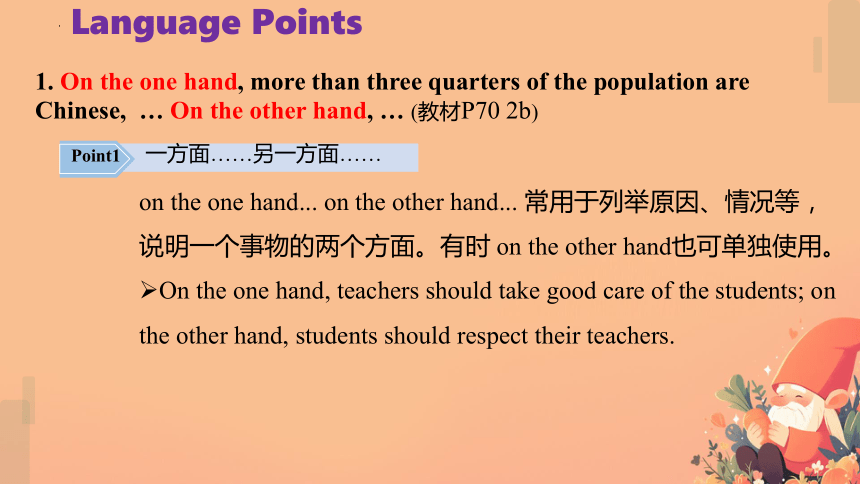
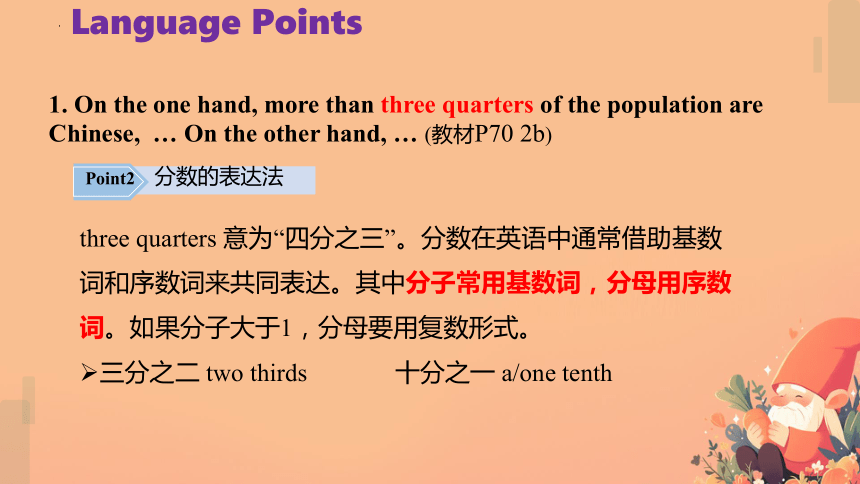

文档简介
(共40张PPT)
Section B(2a—Self Check)
UNIT 9 Have you ever been to a museum
学 习 目 标
2
能够独立向他人描述一个曾经去过的地方。
1
熟练运用现在完成时。
Watch the video.
Let’s share something about my hometown.
课 堂 导 入
Fill in the conversation about Singapore using the information from the article.
2d
A: I’m going to Singapore next week. __________ you ever __________ there before
B: Yes, I've __________ to Singapore many times. It’s my favorite country to visit in __________ Asia.
A: What languages do people __________ there
B: Mostly Chinese and __________.
A: What about the food Is it good
Have
been
been
Southeast
speak
English
Fill in the conversation about Singapore using the information from the article.
2d
B: It's excellent! __________ you ever tried Indian food Indian food is really good in Singapore.
A: I see. Have you __________ heard of the Night Safari Someone told me to go there.
B: Yes! I __________ been to the Night Safari. It was really exciting to __________ the animals in the dark.
A: And is it always __________ in Singapore
B: All __________ round! It's always summer there!
Have
ever
have
watch / see
hot / sunny
year
Language
Location
Food
place to visit
Weather
A small island in Southeast Asia
Putonghua
English
Chinese food,
Indian food,
Western food,
Japanese food
Night Safari
(a zoo at night)
The temperature is almost the same all year round.
Retell the passage.
Hello
你好
Suppose your Chinese friends want to travel to Singapore,
how many reasons can you give
You can try different kinds of food .
You don’t need to worry
about language problems .
You can watch animals
in a different way .
You can go there whenever you like.
It is not far from China ,
so it will not take you too
much time to get there .
Make notes about Singapore. Write down anything that you remember. Do not look at the article.
2e
safe place to take a holiday
can speak Putonghua there
good place to practice English
different kinds of food
temperature the same all year round
fun place--Night Safari
Summary
New words
Expressions
Article
Reading Strategy
fox safe simply fear India Japanese equator spring
thousand whether whenever
thousands of all year round on the one hand, on the other hand
Singapore — A Place You Will Never Forget!
Making notes
Language
Food
Night Safari
whether…or…
whatever,
whoever, …
n. & v.
= no matter when
Temperature
three quarters
Language Points
一方面……另一方面……
Point1
1. On the one hand, more than three quarters of the population are Chinese, … On the other hand, … (教材P70 2b)
on the one hand... on the other hand... 常用于列举原因、情况等,说明一个事物的两个方面。有时 on the other hand也可单独使用。
On the one hand, teachers should take good care of the students; on the other hand, students should respect their teachers.
Language Points
分数的表达法
Point2
1. On the one hand, more than three quarters of the population are Chinese, … On the other hand, … (教材P70 2b)
three quarters 意为“四分之三”。分数在英语中通常借助基数词和序数词来共同表达。其中分子常用基数词,分母用序数词。如果分子大于1,分母要用复数形式。
三分之二 two thirds 十分之一 a/one tenth
Language Points
【拓展延伸】分数修饰名词在句子中作主语时,若该名词为可数名词单数或不可数名词,则谓语动词用单数形式;若该名词为可数名词复数,则谓语动词用复数形式。
About one fifth of the water is polluted.
About two thirds of the students are going to attend the meeting.
Language Points
simply adv. 仅仅;只;不过
Point
2. …, so you can simply speak Putonghua a lot of the time. (教材P70 2b)
simply 在此处相当于 just 或 only。
Simply add hot water and stir.
【拓展延伸】simply 还有“简单地;简朴地”的意思。simple 作形容词,意为“简单的;容易的”。
The book explains grammar simply and clearly.
They live simply.
The machine is very simple to use.
Language Points
fear v. & n. 害怕;惧怕
Point
3. Maybe you fear that you won't be able to find anything good to eat when you travel. (教材P70 2b)
① fear 在此处作及物动词,意为“害怕;惧怕”,相当于be afraid of。
Children usually fear to go out alone at night.
He fears that he may lose his job, so he works hard every day.
② fear 还可作名词,意为“害怕;惧怕” 。be in fear of “害怕……;担心……”。
Don't let a little fear stop you from getting what you want.
We are in fear of tigers.
Language Points
whether conj. 不管……(还是);或者……(或者);是否
Point
4. Whether you like Indian food, Western food or Japanese food, you'll find it all in Singapore!(教材P70 2b)
①在此处 whether 作连词,常与 or 连用,意为“不管……(还是);或者……(或者)”,引导让步状语从句。
Whether the news is true or not, you should be prepared.
② whether 作连词,还可意为“是否”,引导宾语从句(名词从句)。
My deskmate asked me whether I needed any help.
Language Points
whenever conj. 在任何……的时候;无论何时
Point
5. So you can choose to go whenever you like — spring, summer, autumn or winter. (教材P70 2b)
whenever 作连词,此处引导让步状语从句,相当于 no matter when。与其用法相似的还有:
whatever = no matter what 无论什么
whichever = no matter which 无论哪一 个
wherever = no matter where 无论在哪里
whoever = no matter who 无论谁 however = no matter how 无论如何
Language Points
Whenever/No matter when it happened, it was certainly not last Friday.
The quality is the same, whichever of them you choose.
Whoever/No matter who you are, you must obey the school rules.
【拓展延伸】whenever还可意为“每当;每次”,此时用来引导时间状语从句。
Miss Chan is very patient. Whenever we ask questions in class, she explains to us very carefully.
whenever 引导时间状语从句时,不可与 no matter when 互换。
课 堂 学 习
3a
Make a list of facts about your hometown or a place you have been to. Think about these topics.
Size and location: ________________
Population: _____________________
Weather: _______________________
History: ________________________
Places to visit: ___________________
Things to eat: ___________________
Here are some pictures about Hainan.
Hainan
Tianya Haijiao
Wanquan River
示例:
Have you ever been to Hainan Well, I have been there. Last weekend I had a wonderful trip to Hainan with my parents. We went there by plane. The weather was warm. We visited many places of interest, such as Tianya Haijiao, which means “the edge of the sky and the rim of the sea”, and Wanquan River. We went swimming, fishing and diving there.
We also enjoyed the delicious food there. The long white beaches there were very beautiful. I lay on the beach to relax myself quietly. We had a great time. Though we were tired, we all felt very happy. If you go to Hainan, I’m sure you will enjoy yourself.
3b
Write an article to advertise your hometown or a place you have been to.
Have you ever tried/seen/been…
If you…, you will/can…
You should…
One great thing about …is…
Self Check
1 Think about the things below and write an answer for
each one.
1. One thing that you have collected before:
______________________________________________ 2. One invention that you have found to be very useful:
______________________________________________
3. One unbelievable or unusual thing that you’ve seen or heard recently:
4. One way that you’ve used to encourage a friend in the past:
5. One peaceful and quiet place that you’ve been to recently:
2 Complete the conversation.
A: Hey, John. ______ are you doing this weekend
B: Not much, Mark. I don’t really have any plans yet.
A: ______ you ever been to the space museum
B: ______, I have. I ______ there last month.
What
Have
Yes
went
A: Oh, how ______ it
B: It was great. I ______ been there many times.
A: I see. I _____ never _______ there.
B: Well, let’s go this weekend then. I don’t ______ going again. I think there’s something new there. I _____ not see it last time.
A: Perfect!
was
have
have
been
mind
did
3 Complete the chart.
Have you ever been to a/an… How many times What did you see/do there
home for old people
farm
amusement park
Now work in groups. One student in the group will give us a report.
Now give you several minutes to prepare for it.
Group work
课 堂 达 标
你的外国笔友约翰想知道你曾经去过什么地方。
请结合下面图片提示,告诉他你的青岛之旅。
May Fourth Square
beach
Qingdao Landing Stage(青岛栈桥)
Laoshan Mountain
delicious seafood
Now work in groups. Write a passage. You can discuss with your classmates.
示例:
An Unforgettable Trip
I enjoy traveling a lot and I have been to some places on vacation with my parents. Last holiday, my parents took me to Qingdao. It is a modern city. We went there by train. There are many tall buildings in Qingdao. We visited May Fourth Square,the beach and Qingdao Landing Stage. My parents and I like climbing very much, so we climbed the Laoshan Mountain. The seafood in Qingdao is also very delicious. We ate many different kinds of food. I was very happy there and I hope to visit there again.
Homework
1. Write a short passage about your hometown or some places that you have been to.
2. Preview the new words and expressions in Unit 10.
GOODBYE
再见
Section B(2a—Self Check)
UNIT 9 Have you ever been to a museum
学 习 目 标
2
能够独立向他人描述一个曾经去过的地方。
1
熟练运用现在完成时。
Watch the video.
Let’s share something about my hometown.
课 堂 导 入
Fill in the conversation about Singapore using the information from the article.
2d
A: I’m going to Singapore next week. __________ you ever __________ there before
B: Yes, I've __________ to Singapore many times. It’s my favorite country to visit in __________ Asia.
A: What languages do people __________ there
B: Mostly Chinese and __________.
A: What about the food Is it good
Have
been
been
Southeast
speak
English
Fill in the conversation about Singapore using the information from the article.
2d
B: It's excellent! __________ you ever tried Indian food Indian food is really good in Singapore.
A: I see. Have you __________ heard of the Night Safari Someone told me to go there.
B: Yes! I __________ been to the Night Safari. It was really exciting to __________ the animals in the dark.
A: And is it always __________ in Singapore
B: All __________ round! It's always summer there!
Have
ever
have
watch / see
hot / sunny
year
Language
Location
Food
place to visit
Weather
A small island in Southeast Asia
Putonghua
English
Chinese food,
Indian food,
Western food,
Japanese food
Night Safari
(a zoo at night)
The temperature is almost the same all year round.
Retell the passage.
Hello
你好
Suppose your Chinese friends want to travel to Singapore,
how many reasons can you give
You can try different kinds of food .
You don’t need to worry
about language problems .
You can watch animals
in a different way .
You can go there whenever you like.
It is not far from China ,
so it will not take you too
much time to get there .
Make notes about Singapore. Write down anything that you remember. Do not look at the article.
2e
safe place to take a holiday
can speak Putonghua there
good place to practice English
different kinds of food
temperature the same all year round
fun place--Night Safari
Summary
New words
Expressions
Article
Reading Strategy
fox safe simply fear India Japanese equator spring
thousand whether whenever
thousands of all year round on the one hand, on the other hand
Singapore — A Place You Will Never Forget!
Making notes
Language
Food
Night Safari
whether…or…
whatever,
whoever, …
n. & v.
= no matter when
Temperature
three quarters
Language Points
一方面……另一方面……
Point1
1. On the one hand, more than three quarters of the population are Chinese, … On the other hand, … (教材P70 2b)
on the one hand... on the other hand... 常用于列举原因、情况等,说明一个事物的两个方面。有时 on the other hand也可单独使用。
On the one hand, teachers should take good care of the students; on the other hand, students should respect their teachers.
Language Points
分数的表达法
Point2
1. On the one hand, more than three quarters of the population are Chinese, … On the other hand, … (教材P70 2b)
three quarters 意为“四分之三”。分数在英语中通常借助基数词和序数词来共同表达。其中分子常用基数词,分母用序数词。如果分子大于1,分母要用复数形式。
三分之二 two thirds 十分之一 a/one tenth
Language Points
【拓展延伸】分数修饰名词在句子中作主语时,若该名词为可数名词单数或不可数名词,则谓语动词用单数形式;若该名词为可数名词复数,则谓语动词用复数形式。
About one fifth of the water is polluted.
About two thirds of the students are going to attend the meeting.
Language Points
simply adv. 仅仅;只;不过
Point
2. …, so you can simply speak Putonghua a lot of the time. (教材P70 2b)
simply 在此处相当于 just 或 only。
Simply add hot water and stir.
【拓展延伸】simply 还有“简单地;简朴地”的意思。simple 作形容词,意为“简单的;容易的”。
The book explains grammar simply and clearly.
They live simply.
The machine is very simple to use.
Language Points
fear v. & n. 害怕;惧怕
Point
3. Maybe you fear that you won't be able to find anything good to eat when you travel. (教材P70 2b)
① fear 在此处作及物动词,意为“害怕;惧怕”,相当于be afraid of。
Children usually fear to go out alone at night.
He fears that he may lose his job, so he works hard every day.
② fear 还可作名词,意为“害怕;惧怕” 。be in fear of “害怕……;担心……”。
Don't let a little fear stop you from getting what you want.
We are in fear of tigers.
Language Points
whether conj. 不管……(还是);或者……(或者);是否
Point
4. Whether you like Indian food, Western food or Japanese food, you'll find it all in Singapore!(教材P70 2b)
①在此处 whether 作连词,常与 or 连用,意为“不管……(还是);或者……(或者)”,引导让步状语从句。
Whether the news is true or not, you should be prepared.
② whether 作连词,还可意为“是否”,引导宾语从句(名词从句)。
My deskmate asked me whether I needed any help.
Language Points
whenever conj. 在任何……的时候;无论何时
Point
5. So you can choose to go whenever you like — spring, summer, autumn or winter. (教材P70 2b)
whenever 作连词,此处引导让步状语从句,相当于 no matter when。与其用法相似的还有:
whatever = no matter what 无论什么
whichever = no matter which 无论哪一 个
wherever = no matter where 无论在哪里
whoever = no matter who 无论谁 however = no matter how 无论如何
Language Points
Whenever/No matter when it happened, it was certainly not last Friday.
The quality is the same, whichever of them you choose.
Whoever/No matter who you are, you must obey the school rules.
【拓展延伸】whenever还可意为“每当;每次”,此时用来引导时间状语从句。
Miss Chan is very patient. Whenever we ask questions in class, she explains to us very carefully.
whenever 引导时间状语从句时,不可与 no matter when 互换。
课 堂 学 习
3a
Make a list of facts about your hometown or a place you have been to. Think about these topics.
Size and location: ________________
Population: _____________________
Weather: _______________________
History: ________________________
Places to visit: ___________________
Things to eat: ___________________
Here are some pictures about Hainan.
Hainan
Tianya Haijiao
Wanquan River
示例:
Have you ever been to Hainan Well, I have been there. Last weekend I had a wonderful trip to Hainan with my parents. We went there by plane. The weather was warm. We visited many places of interest, such as Tianya Haijiao, which means “the edge of the sky and the rim of the sea”, and Wanquan River. We went swimming, fishing and diving there.
We also enjoyed the delicious food there. The long white beaches there were very beautiful. I lay on the beach to relax myself quietly. We had a great time. Though we were tired, we all felt very happy. If you go to Hainan, I’m sure you will enjoy yourself.
3b
Write an article to advertise your hometown or a place you have been to.
Have you ever tried/seen/been…
If you…, you will/can…
You should…
One great thing about …is…
Self Check
1 Think about the things below and write an answer for
each one.
1. One thing that you have collected before:
______________________________________________ 2. One invention that you have found to be very useful:
______________________________________________
3. One unbelievable or unusual thing that you’ve seen or heard recently:
4. One way that you’ve used to encourage a friend in the past:
5. One peaceful and quiet place that you’ve been to recently:
2 Complete the conversation.
A: Hey, John. ______ are you doing this weekend
B: Not much, Mark. I don’t really have any plans yet.
A: ______ you ever been to the space museum
B: ______, I have. I ______ there last month.
What
Have
Yes
went
A: Oh, how ______ it
B: It was great. I ______ been there many times.
A: I see. I _____ never _______ there.
B: Well, let’s go this weekend then. I don’t ______ going again. I think there’s something new there. I _____ not see it last time.
A: Perfect!
was
have
have
been
mind
did
3 Complete the chart.
Have you ever been to a/an… How many times What did you see/do there
home for old people
farm
amusement park
Now work in groups. One student in the group will give us a report.
Now give you several minutes to prepare for it.
Group work
课 堂 达 标
你的外国笔友约翰想知道你曾经去过什么地方。
请结合下面图片提示,告诉他你的青岛之旅。
May Fourth Square
beach
Qingdao Landing Stage(青岛栈桥)
Laoshan Mountain
delicious seafood
Now work in groups. Write a passage. You can discuss with your classmates.
示例:
An Unforgettable Trip
I enjoy traveling a lot and I have been to some places on vacation with my parents. Last holiday, my parents took me to Qingdao. It is a modern city. We went there by train. There are many tall buildings in Qingdao. We visited May Fourth Square,the beach and Qingdao Landing Stage. My parents and I like climbing very much, so we climbed the Laoshan Mountain. The seafood in Qingdao is also very delicious. We ate many different kinds of food. I was very happy there and I hope to visit there again.
Homework
1. Write a short passage about your hometown or some places that you have been to.
2. Preview the new words and expressions in Unit 10.
GOODBYE
再见
同课章节目录
- Unit 1 What's the matter?
- Section A
- Section B
- Unit 2 I'll help to clean up the city parks.
- Section A
- Section B
- Unit 3 Could you please clean your room?
- Section A
- Section B
- Unit 4 Why don't you talk to your parents?
- Section A
- Section B
- Unit 5 What were you doing when the rainstorm came
- Section A
- Section B
- Review of Units 1-5
- Unit 6 An old man tried to move the mountains.
- Section A
- Section B
- Unit 7 What's the highest mountain in the world?
- Section A
- Section B
- Unit 8 Have you read Treasure Island yet?
- Section A
- Section B
- Unit 9 Have you ever been to a museum?
- Section A
- Section B
- Unit 10 I've had this bike for three years.
- Section A
- Section B
